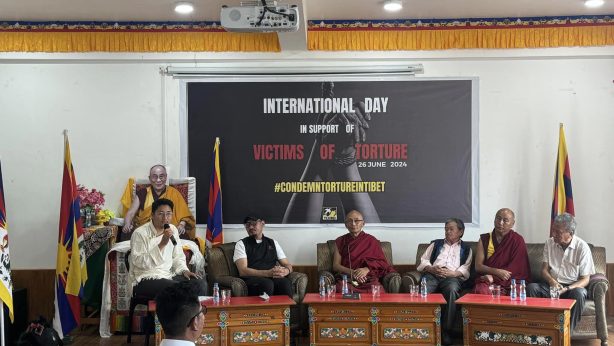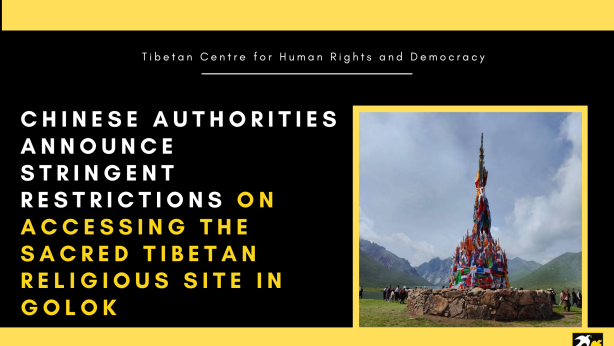TCHRD hosts seminar on Nepal, China and Tibet at JNU
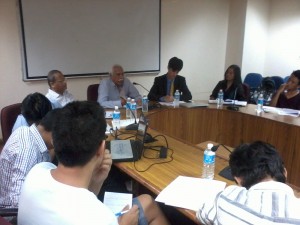
On 22 and 23 August, the Tibetan Centre for Human Rights and Democracy (TCHRD), working with the Jawaharlal Nehru University (JNU) Tibetan Students Forum, hosted a seminar on the Nepal-Tibet Relations and the Sino-Tibet Conflict. The two-day seminar gave the 100 attendees an opportunity to hear from and discuss with Indian and Tibetan government officials, academics, and students.
According to Tsering Tsomo, the executive director of TCHRD, the idea behind this seminar was to bring together students, academics, and practitioners to draw attention to some of the important, but frequently overlooked, issues regarding the Tibetan community. “The aim for the two-day seminar was to better understand and improve the situation for Tibetans in Nepal as well as to hear from emerging Tibetan scholars and their perspectives on the Sino-Tibetan conflict.”
The first session of the seminar focused on Tibetans in Nepal. The first speaker was Jayadeva Ranade, a Former Additional Secretary in the Cabinet Secretariat of the Government of India and the President of the Centre for China Analysis and Strategy. Ranade focused on how Nepal and People’s Republic of China’s close cooperation, including over Tibetans, impacted India’s security. The next speaker, Tenzin Nyinjey, TCHRD’s research officer, presented Maria Sharapan’s MA thesis. Sharapan, a graduate student at the University of Jyväsklä in Finland, was unable to attend the seminar. Her thesis, which is based on three months of field research in Nepal, discussed identity formation for Tibetans living in Nepal and Nyinjey was able to add a few personal anecdotes as well. The final speaker for the morning session was Dr Rajesh Kharat, an associate professor at JNU, whose areas of interest include study of Himalayan states of South Asia (Bhutan and Nepal), and other contemporary issues like forced migration, terrorism and regional cooperation. Dr Kharat, who had recently returned from Nepal, talked about how Nepal’s policy toward Tibetan refugees has changed, beginning with the Nepalese government relabeling Tibetans from refugees to “persons of concern” and ending with the closing of the Tibetan Refugee Reception Centre and the imposition of frequent check points along Nepal-Tibet border to apprehend Tibetans fleeing Tibet to Nepal.
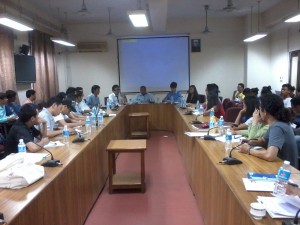
The final hour of the morning was opened up for questions. This led to a wide-ranging discussion on, among other things, the various interests in Nepal, the current situation in Nepal for Tibetans, and the impact of the Tibetan community on Sino-Indian relations. The afternoon session on 22 August, which was moderated by Srikanth Kondapalli, a well-known professor in Chinese studies at JNU, built upon the morning session and talked about the historical relations between what is now considered Tibet and Nepal, the applicable international legal standards for the treatment of refugees, and Tibetans in Nepal. The first speaker was Binayak Sundas, a PhD candidate at JNU. Sundas examined how the relationship between Lhasa and Kathmandu fluctuated between periods of close trade and engagement to more isolation from the 13th century and into the 18th century.
John Gaudette, a legal research officer at TCHRD, then spoke about how and why the international prohibition of returning people to their persecutors applied to returning of Tibetans to the PRC by the Nepalese government, acting under Chinese pressure. Prof. Sangeeta Thapliyal, a professor at JNU who works on strategic issues concerning South Asia with a special reference to Nepal, spoke about domestic, bilateral, and multilateral explanations for how Nepal has managed its relations with India and the PRC and treated Tibetans. In particular, she focused on how Tibetans in Nepal are viewed as a political issue and not a human rights issue and as a result as Nepal seeks closer relations with the PRC the treatment of Tibetans deteriorates.
Like the morning session, the afternoon session was followed by an extensive question and answer session. The question and answer focused on the history of Tibet-Nepal relations and continued on some of the discussions from the previous session on the treatment of Tibetans refugees in Nepal and elsewhere. Most of the second day was devoted to hearing emerging voices talk about Tibet from historical, political, economic, and environmental perspectives. Five of the six speakers were Tibetan students pursuing graduate degrees at JNU. The first speaker, though, was a press officer at the Central Tibetan Administration, Dharamsala, India. Tsering Wangchuk spoke about the Middle Way Approach and addressed misconceptions and Chinese misinformation about it. Lobsang Yangtso, a PhD Candidate at JNU, spoke about the consequences of the extensive damming of rivers in Tibet. She mentioned that, since the 1950s, China has built 22,000 large dams, out of an estimated 50,000 large dams worldwide, making China the most dammed country. She specifically focused her talk on Chinese proposals to put dams on the last undammed river in Tibet, the Yarlung Tsangpo River, or Brahmaputra River. Current plans for the Yarlung Tsangpo River involve putting 11 dams along the river, including what would be the world’s largest dam at the Great Bend portion of the river.
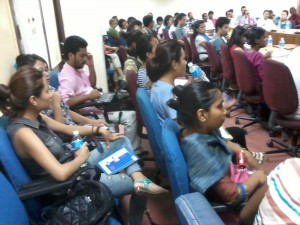
The final speaker for the morning session was Dolma Tsering, who is also a PhD Candidate at JNU. She discussed how many Tibetans are being left out of Tibet’s economic development. Her presentation focused specifically on Tibet Autonomous Region. Even in Tibetan areas, only an average of 20% of government positions are held by Tibetans and from 2000 to 2003 the number of Tibetans employed in State owned units dropped by 18% from 71% to 53%. This is on top of a growing divide between urban areas, which are increasingly lived in by Chinese migrants, and rural areas, which remain predominately Tibetan. A lively question and answer session followed the morning’s presentations. A few of the attendees’ questions focused on how the Middle Way Approach could be implemented.
The final session of the day followed the theme of various attempts by non-Tibetans to redefine Tibetan nationality, cultural identity, and religion, and denial of Tibetan agency. The first speaker in the afternoon session was Tenzin Lhadon, a PhD candidate from JNU. She talked about how the PRC lobbying efforts for the “One China Policy” have expanded to include Tibet as well as Taiwan. The “One China Policy” seeks to define Tibet as an inalienable part of The PRC and a core interest. Ugyan Choedup, a 2nd year Master of Philosophy candidate at JNU, discussed the effects of the PRC trying to label and define Tibetan culture as Chinese. These efforts, he said, have led to a resurgence in Tibetan identity. Just as the humiliation of colonialism led the Chinese to romanticize a “golden age” when they were powerful, the Chinese occupation of Tibet crystalized Tibetan national identity around a Tibetan golden around the 11th century. The last speaker of the seminar was Za Thinley, a Master of Philosophy candidate at JNU. His research focused first hand accounts by Christian missionaries of their strategies to convert Tibetans. These strategies primarily focused on blurring the distinction between Buddhism and Christianity and forcing Christian beliefs into Buddhist rituals and practices. They were mostly unsuccessful. He also explored current attempts by Chinese authorities to encourage missionary activities in Tibetan areas while putting restrictions on the same in Mainland China.
In the question and answer the participants focused on tying many of the themes from the seminar together. These included questions on the treatment and identity of Tibetans today both inside and outside Tibet and those who are not Buddhists.
In December this year, TCHRD will come out with a publication containing all the papers presented at the seminar in both soft and hard copy.
Visit TCHRD’s Facebook page to view more pictures of the seminar at https://www.facebook.com/tchrd
For more information on current situation of Tibetans in Nepal, read this recent report by Human Rights Watch: http://www.hrw.org/news/2014/04/01/nepal-increased-pressure-china-threatens-tibetans

